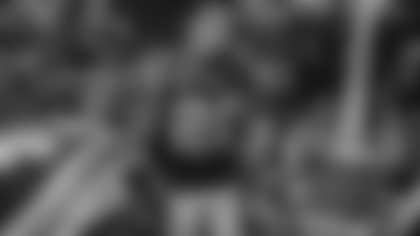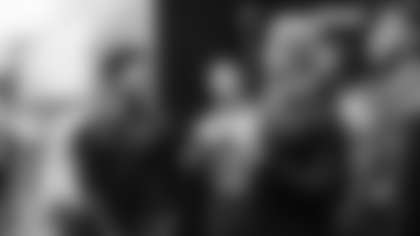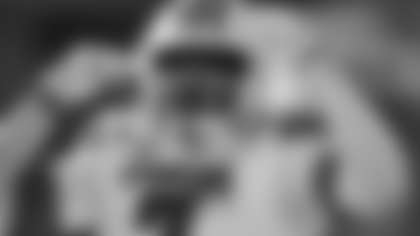CHARLOTTE — Few people have the kind of insight into this week's Panthers-Chiefs matchup as Kurt Coleman.
Drafted in 2010 by Chiefs coach Andy Reid's Eagles out of Ohio State, he followed his old coach to Kansas City in 2014. But coming to Charlotte as a free agent in 2015 changed things for Coleman, as he established himself as a leader and one of the most productive safeties in the game.
He intercepted seven passes in 2015 as part of a defense full of big talents and big personalities that went 15-1 and appeared in the Super Bowl (and that doesn't even count the personality on the other side of the ball).
Coleman stayed in Charlotte, where he contributes to the Panthers Radio Network. He's also this week's Legend of the Game and will hit the Keep Pounding drum heading into the fourth quarter of Sunday's game.
Panthers.com caught up with Coleman this week to catch up on a number of topics.

Q: You spent time with Andy Reid in two cities and obviously were a huge part of this place in 2015. When you think back, what allowed you to take off the way you did when you arrived here?
Coleman: "So if I can kind of take you actually back to my time in Philly when I was drafted by Andy, it was one of the biggest blessings that I didn't even know at the time, being drafted by an organization that had him and his coaching staff in place.
"Now, I did go through a couple of different defensive coordinators (including future Panthers coordinator Sean McDermott), but what I realized is that helped me learn the game of football from multiple views and understand different terminologies, which really did play into the later years because understanding things quickly is the name of the game.
"Being underneath Andy Reid helps set the precedent of how to be a professional, how to enjoy work, but yet understand what you're striving for. And I know we had a 10-6 season in my first year, but then we had some rocky mountains through that time, which ended up leading him to Kansas City. But what brought me back to Kansas City is that when I became a free agent in 2014, he took over organizations and created family-like atmospheres for everybody, but yet within the family-like atmosphere, you're always pushing almost to please and not let him down. And so when I went to Kansas City, I ended up being the dime safety, the third safety to come on the field, and I ended up leading the team in interceptions. This is why when I left there, I actually thought I would sign back in Kansas City for another year, but I wanted to sign a multi-year deal, and all that I was going to get was a one-year deal there, which brought me to Carolina. And that was another blessing because, again, my first defensive coordinator was here.
"So when I looked at everything, I mean everything, it led to that point when we went to the Super Bowl. I had my career-best year in 2015. All that stuff led from that very first phone call that I got from Andy Reid in April of 2010 saying, hey, we're drafting you to Philadelphia. I mean, it literally laid the foundation of how my career took off, but it took some time, and slowly but surely, I learned what it looked like to be a leader. I realized what it looked like to be a community member. I realized what it looked like to be an integral part of the organization outside of just what you do on the field, but how you integrate yourself within the coaching and learn and grow. I mean, look, I was around Matt Nagy, I was around Doug Pederson, so I was learning from all the offensive guys of what do, what do they look for or how do they try to attack different defenses, and that's just how I learned the game, I was learning it from both sides of the ball, and that really did help me learn football at its highest level and put myself in positions to make the most places as I could, right?"
Q: When you got here, what was your first impression when you walked in the door? Because that was a team, obviously, Cam Newton was on one side of the ball, but you walked into a defense with Luke Kuechly, Thomas Davis, and so many others. What was it like just kind of joining that as an outsider?
Coleman: "I think defensively, you've got a TD who plays the way he does and Luke, you look at Luke, who was essentially a star in the league as a middle linebacker, he was the first person to say, hey, if there's anything you need, if you want anything, just reach out to me. I think that it was really cool when you entered that locker room, but then you looked at our defense. That year, you know, we had a Roman Harper who I knew, but we had never had a chance to get to know each other. A Tre Boston who was young coming into a second year, and then we had signed Peanut Tillman, who I think was in his 13th year at the time. Then you had a J-No (Josh Norman) that was getting ready to explode into Batman. There were so many different personalities, but I felt like the defense side of the ball; we knew who we were. We knew that, yes, we did have quote-unquote superstars, but we were very just organized, and we knew how to sacrifice for one another so that we could all kind of shine.
"But what I loved, though, was on the offensive side of the ball, you did have the Cam personality because it really did bring out the best in us as a defense. He would challenge us. It really did challenge us because every single day we stepped on the field against the offense, we wanted to shut them up. That was the fun, like brother-sibling rivalry that we had, when we got to go against each other, and I loved it because, you know what, Cam would push all of those guys around. He made that offensive line better. He made the running backs, the wide receivers, and the tight ends; obviously, those guys worked well because of Cam.
"And it really, our team was such a cohesive unit. We were one big family, and I loved it. Because if you go to a family barbecue, guess what, you're going to have your uncle that, you know, don't talk to Uncle James over there. He gets a little crazy. We had one of those, but then you have your sweet aunties. I mean, it was such a family that it made so much sense for us, and the success was because it all came together. Not to say that we didn't have the stars, because we had plenty of stars, but I never felt like that year one person needed to shine greater than the other. We were all going to get our shine, and then sometimes it just came at different moments."

Q: What was more fun? Practices against those guys or game day?
Coleman: "Well, honestly, practice replicated game day; game day was just a manifestation of what we did at practice. Practices were incredibly fun and, like I said, incredibly competitive. I mean, obviously, you can go back to the time that J-No and Cam were fighting (during training camp), but even beyond that, it was literally every day.
"When we're on the sideline, it was a race when our defense went out to go out for a new period. We raced and tried to see who could sprint to the ball the fastest to touch the ball. It was just little silly games about who could do this faster or better, or we would have interception contests all the time. It really was a constant challenge at practice, but it was such a fun atmosphere.
"You look at some of the old video clips that I look at, and I love it; we're warming up, and we would have dance contests. I mean, it's just the stuff that you just can't make up. It is naturally just organic, and it happens and then and it became a tradition every single practice, you know. And then you would have JJ Jansen trying to do the dab and all this stuff. It was a really fun, exciting time to be there because every guy wanted the best, and we're going to push each other to be the best."
Q: You can tell the truth now. Who was the best dancer on that team, and the worst?
Coleman: (Laughs) "I'm sure a lot of guys would probably say they were the best. We had some guys that, I mean, that was a moving and grooving group. I don't know if I would say best dancer, but I think Lou Young and Dean Marlowe were two guys that we always made dance, and then obviously from there, you know, you would have your Tre Bostons trying to break it down, and then on the opposite side of the ball we had a couple of running backs, Fozzy Whittaker and some other guys.
"I would say probably the worst dancer, but was always going out there and trying to do it was JJ. I respect it. I always say this, and you've got to put an asterisk on it. The only reason why I would say he wasn't the worst was because he was the only one who was willing to try it. I'm sure there were worse ones out there that did not step out of their comfort zone and try to do anything."

Q: To be back here this weekend and to be a part of Panthers history, what does it mean to you to be able to hit that Keep Pounding drum?
Coleman: "It's a blessing. I knew that from the moment that I had a chance to kind of look at the jerseys, the inscription on the inside of our collar was added, and then when you learn about why that came about and when it came about and who started it, I think it signifies something much more than just a play on the field. It signifies something much deeper. You fight for one more inch and you don't stop. So when you put on the jersey, no matter what, when you think you're stopped, you Keep Pounding. That to me is who the Carolina Panthers are and have been and always will be, in my opinion."
















